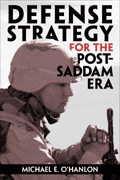The Brookings Institution has long produced an analysis of America’s defense budgets and policies. The war on terror and the ongoing operations in Iraq and Afghanistan have forced upon this country soaring defense budgets and unprecedented challenges in policymaking. In the newest installment in this tradition, leading foreign policy expert Michael O’Hanlon offers policy recommendations for strengthening the ability of America’s military to respond to international crises in a tumultuous world. The United States can, for the foreseeable future, be confident that its armed forces will remain engaged in Iraq, as well as in Afghanistan and other theaters in the war on terror. It will also need to remain involved in deterrence missions in the western Pacific, most notably in Korea and the Taiwan Strait. It will wish to remain engaged in European security, since the capabilities and cohesion of the NATO alliance have important implications for the United States globally. O’Hanlon reviews these priorities, asking tough questions and developing frameworks for answering them: • What military will the United States need in the future? • How much will it cost? • How can the U.S. increase the size of its ground forces without increasing the size of the defense budget? • In an era of apocalyptic terror threats, and at a time of $400 billion defense budgets and $400 billion federal budget deficits, how can this country protect its citizens while maintaining fiscal responsibility?
Author

Michael E. O'Hanlon is a senior fellow in Foreign Policy Studies at the Brookings Institution, where he holds the Sydney Stein Jr. Chair. His recent books include The Future of Arms Control (Brookings, 2005; with Michael A. Levi), Neither Star Wars nor Sanctuary (Brookings, 2004), and Crisis on the Korean Peninsula (McGraw Hill, 2003; with Mike Mochizuki).

